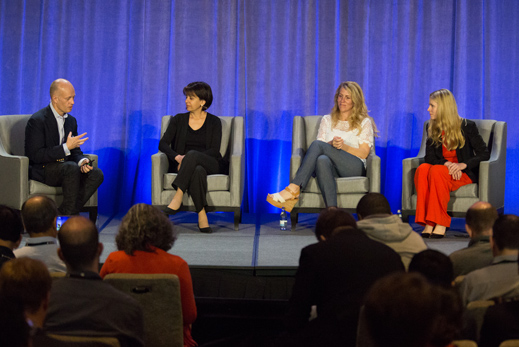EmTech Digital: Worrying About Privacy and Security
Online privacy and security are not new worries for companies, governments, and consumers, but they have been brought to a point of urgency by recent regulatory and technology changes, security experts explained at EmTech Digital on Tuesday.

Among these new worries: a reëxamination of the open global Internet now under way in the EU, and the way the Internet of things taps into a world of personal data.
“Technology is converging on maximum invasiveness,” said Corbett Moran, a postdoctoral researcher at the California Institute of Technology and a well-known coder and expert on encryption. Commonly accepted ideas such as the privacy of nude photos have begun to be violated, said Moran.
“For maximum good [from the Internet of things] we need maximum invasiveness, potentially invading our privacy in an incontrovertible way that the average person will be aware of. They will be staring it in the eyes, and it may literally have eyes,” she said.
That means businesses, including those that may have downplayed these concerns up until now, will no longer be able to do so, she said.
“I’m not going to predict we are on the cusp of losing our users’ trust, but I do think people are getting more and more concerned about what’s happening on the Web. If we lose the trust, it’s hard to regain,” warned Denelle Dixon-Thayer, senior vice president, business and legal affairs, Mozilla.
“It’s the creep factor. People are worried about, ‘Why am I getting that ad for the shoes I looked at yesterday?’ “
To Dixon-Thayer, the answer to that is greater transparency with users about how their data is being used.
Melanie Haratunian, executive vice president and general counsel, Akamai, focused on a higher-level trend toward countries considering policies of “data localization” that would require data be stored within geographic boundaries, something she argued would also harm consumers.
As the company that moves 15 to 30 percent of the world’s Web traffic over its servers each day, Akamai’s business would be hurt, too.
“It doesn’t enhance privacy, it undermines digital security. Centralized storage of data increases the vulnerability of that location to attack, and it potentially limits a system’s capacity to absorb attacks, Haratunian said.
Keep Reading
Most Popular
Large language models can do jaw-dropping things. But nobody knows exactly why.
And that's a problem. Figuring it out is one of the biggest scientific puzzles of our time and a crucial step towards controlling more powerful future models.
The problem with plug-in hybrids? Their drivers.
Plug-in hybrids are often sold as a transition to EVs, but new data from Europe shows we’re still underestimating the emissions they produce.
Google DeepMind’s new generative model makes Super Mario–like games from scratch
Genie learns how to control games by watching hours and hours of video. It could help train next-gen robots too.
How scientists traced a mysterious covid case back to six toilets
When wastewater surveillance turns into a hunt for a single infected individual, the ethics get tricky.
Stay connected
Get the latest updates from
MIT Technology Review
Discover special offers, top stories, upcoming events, and more.